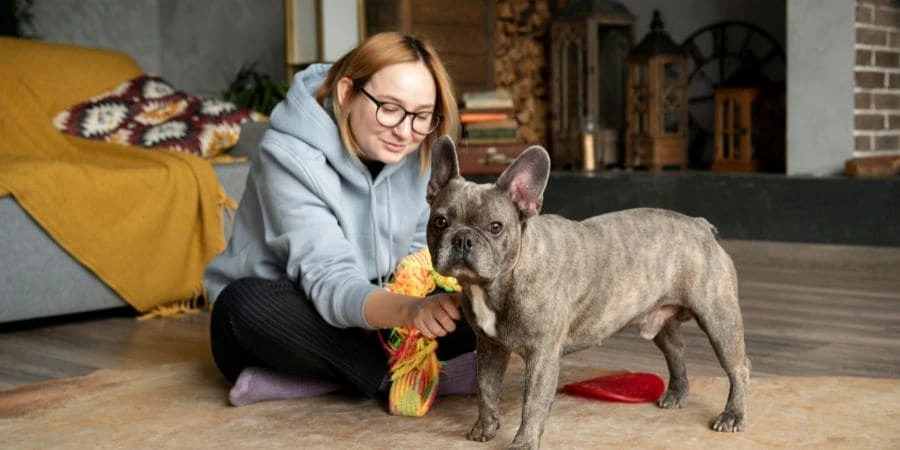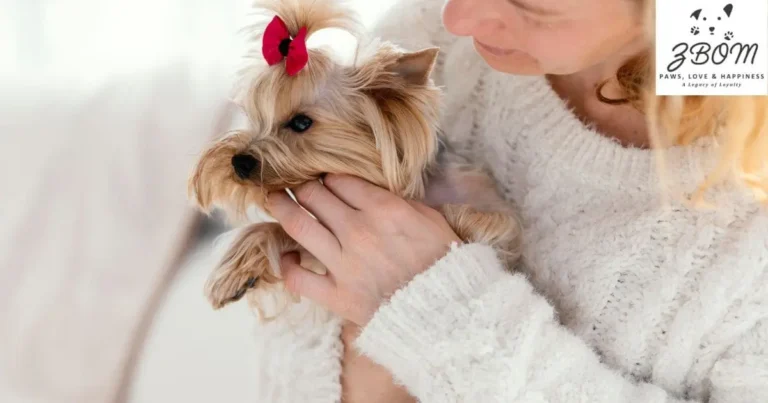
How to Care for Your Pied Frenchies Effectively
How to Care for Your Pied Frenchies Effectively French Bulldogs, often called Frenchies, are lovable companions with compact bodies, flat faces, and charming personalities. As a dog parent, understanding their daily maintenance and care routine is essential to ensure they thrive in a safe and healthy environment.
Because of their unique flat faces, Frenchies can have breathing difficulties and are prone to overheating. Exercise limits should be considered carefully; short walks and gentle play are ideal to prevent stress on their respiratory system. Their environmental needs include a cool, comfortable space free from extreme temperatures.
One important aspect of pet care for French Bulldogs is maintaining their skin folds. These folds can trap moisture and dirt, making them susceptible to infections. Regular cleaning and monitoring are crucial for pet health.
Providing proper daily maintenance, attention to exercise limits, and meeting their environmental needs helps your four-legged friend stay healthy and happy. With consistent care routine and affection, Frenchies can provide immense stress relief and joy to their owners.
Being a dedicated dog parent ensures your four-legged friend enjoys a long, happy life as a beloved companion.
Short answer about: Frenchie Behavior & Emotional Well-Being
French Bulldogs are affectionate, social dogs that thrive on companionship and interaction with their owners. Their behavior reflects a mix of playful energy, loyalty, and occasional stubbornness. Frenchies are highly people-oriented, which makes them prone to separation anxiety if left alone for long periods. They enjoy mental stimulation through games, training, and interactive toys, which helps prevent boredom and promotes emotional well-being. Positive reinforcement, consistent routines, and early socialization are essential to shaping good behavior. Ensuring a Frenchie feels safe, loved, and engaged contributes significantly to their happiness, emotional stability, and overall quality of life.
Frenchie Behavior & Emotional Well-Being
Proper dog care for French Bulldogs goes beyond their physical needs to include emotional health. As naturally social dogs, Frenchies thrive on companionship and mental engagement, which are essential for their overall well-being.
Also Read: How Long are French Bulldogs Pregnant
Boredom prevention is crucial for keeping your Frenchie happy. Provide toys, treat-dispensing puzzles, and snuffle mats that encourage natural foraging behaviors. Teaching tricks not only offers mental stimulation but also strengthens the bond between you and your pet. Effective training involves short sessions focused on commands, positive reinforcement, and rewarding with treats.

Many French Bulldogs experience separation anxiety due to their attachment to owners. Creating a safe space with familiar items that carry your scent, along with background noise like a radio, can help reduce anxiety. In some cases, calming aids such as pheromone diffusers may assist in stress reduction.
By focusing on both mental and emotional care, you ensure your Frenchie enjoys a happy, healthy life full of stimulation, security, and love.
Creating the Best Home Environment
A suitable home setup is essential in Frenchie dog care, as these are highly sensitive dogs. Their surroundings and temperature fluctuations directly impact their health and comfort.
During summer, maintain a cool environment using air conditioning or fans in areas where your Frenchie rests, like their resting area. Cooling mats offer extra relief on hot days. Limit walks to early morning or evening hours to prevent heat stress, and always carry water to avoid overheating.
Also Read: When Can Male Dogs Get females Pregnant
In winter, French Bulldogs face challenges due to their short coats, which provide minimal protection against the cold. Sweaters and coats are necessary for outdoor trips. Indoors, provide warm bedding away from drafts, and consider raised beds to keep them off cold floors. Never leave your Frenchie outside in cold weather to prevent hypothermia.
A carefully managed home setup ensures your Frenchie stays healthy and comfortable all year round.
Grooming French Bulldogs
Proper grooming of French Bulldogs (Frenchies) goes beyond just keeping their short coat clean. Regular coat care, skin care, ear care, dental care, and nail care are essential to prevent discomfort and avoid health issues. Their unique facial structure and skin folds require special attention.
Grooming Requirements:
Frenchies have a short coat that is low-maintenance but still requires brushing with a slicker brush or comb weekly to remove shedding hairs. How to Care for Your Pied Frenchies Effectively Brushing also promotes skin health by spreading natural oils. Pay special attention to skin folds, as trapped moisture and dirt can cause infections if not cleaned regularly.
Bathing:
Bathing: Bathe your Frenchie every few weeks or as needed using a hypoallergenic dog shampoo to prevent skin irritation. Make sure to thoroughly clean and dry facial folds to avoid bacterial build-up, but avoid overbathing, which can lead to dryness.
Dental Care:
French Bulldogs are prone to tartar build-up and gum disease, so regular teeth brushing is important. Cleaning their teeth a few times per week helps prevent serious dental problems.
Dental care:
Their large standing ears are prone to ear infections from wax buildup, redness, or unusual odour. Clean their ears weekly with an ear-cleaning solution using a soft cloth or cotton ball, but avoid cotton swabs as they can push debris further inside.
Consistent grooming ensures your Frenchie stays healthy, comfortable, and happy while preventing common health issues associated with their unique anatomy.
Common Health Issues in French Bulldogs
French Bulldogs (Frenchies) are adorable, but their unusual conformation makes them prone to multiple health problems. Understanding these issues helps prevent complications and ensures your Frenchie stays healthy.
Brachycephalic Airway Syndrome (BAS): Due to their flat faces, French Bulldogs are prone to BAS, a condition affecting the upper respiratory tract that can cause breathing issues. On hot days, exercise restriction helps prevent overheating, and in severe cases, surgery may be needed to improve breathing.
Also Read: How Much are Fluffy French Bulldogs
Hip Dysplasia: Though more common in larger breeds, Frenchies can develop hip dysplasia, where the hip joint doesn’t fit properly, How to Care for Your Pied Frenchies Effectively causing pain and lameness. Maintaining a healthy weight and providing joint supplements can help, while surgery may be necessary in serious cases.
Spinal Disorders: French Bulldogs are susceptible to spinal disorders like Intervertebral Disc Disease (IVDD), where spinal discs bulge or rupture, potentially leading to paralysis. Back protection is essential, so avoid jumping or activities that put spine strain on your dog.
Skin Fold Dermatitis: Moisture and dirt trapped in skin folds can cause dermatitis, resulting in itchiness, redness, and infection. Regular cleaning and drying of the folds help prevent this condition.
Allergies: French Bulldogs have delicate skin and can develop allergic reactions due to environmental factors like pollen, dust mites, or food ingredients. Managing diet, medications, and environmental adjustments can relieve symptoms.
Eye Conditions: Frenchies are prone to eye conditions such as cherry eye, corneal ulcers, and conjunctivitis. Cherry eye occurs when the gland of the third eyelid swells. Prompt veterinary care helps maintain eye health and prevent complications.
By understanding these common health problems, you can ensure your French Bulldog remains safe, comfortable, and healthy throughout their life.
Training a French Bulldog
Training a French Bulldog (Frenchie) can be both rewarding and challenging due to their playful nature and sometimes stubborn nature. Although they are intelligent and eager to please, their streak of independence requires a consistent approach and a patient approach to achieve the best results. Using positive reinforcement and maintaining a routine from early training is key.
Best Training Methods: Frenchies respond best to methods that are consistent, positive, and filled with encouragement. Short training sessions that are engaging are more effective than long, repetitive ones. Start with basic commands like “sit,” “stay,” “come,” and “leave it,” using clear language. Repetition helps reinforce learning, while boredom prevention is important. Incorporating playtime keeps your Frenchie motivated.
Also Read: How to Determine Frenchie Stud Fee Effectively
Socialisation: Proper socialisation is a pet owner responsibility. Early socialisation helps Frenchies become well-rounded dogs comfortable around people, animals, and different environments. Introduce new experiences in a controlled introduction, and consider puppy socialisation classes at veterinary practices to safely expose them to other dogs and basic commands.
Treats and Rewards: Positive reinforcement with treats, rewards, praise, or affection is the most effective way to teach your Frenchie. Use soft treats for quick eating, paired with verbal praise to reinforce positive behaviour immediately.
Common Training Issues: French Bulldogs can be stubborn, making potty training and obedience challenging. Maintain calmness and patience, avoiding punishment which can cause fear and anxiety. Rewarding positive behaviour is far more effective.
By beginning early training, staying consistent, and focusing on positive reinforcement, you can raise a well-behaved, obedient, happy dog. This approach also strengthens bonding between you and your Frenchie.
Activities for French Bulldogs
French Bulldogs (Frenchie) may not be a high-energy breed, but regular exercise is essential to keep them healthy, prevent obesity, and support their mental well-being. Staying active also strengthens the bond between you and your Frenchie.
Fetch:
Despite their compact size and brachycephalic (flat-faced) build, many French Bulldogs enjoy a game of fetch. Using a lightweight ball or soft toy is ideal. Keep short sessions of 5–10 minutes to avoid overexertion, especially in warm weather. On hot or rainy days, indoor fetch provides a controlled environment to burn energy safely.
Interactive Toys:
Frenchies are curious and smart, making interactive toys perfect for them. Puzzle feeders or treat-dispensing toys provide mental enrichment while also promoting physical activity.
Also Read: How Many Puppies do French Bulldogs Have
Tug-of-War: A gentle game of tug-of-war using a durable rope toy is another fun way to exercise your Frenchie. Be careful with jaw care, and letting your Frenchie win occasionally builds confidence and strengthens your bond.
Short Walks:
Leisurely walks give your Frenchie a chance to explore without overexertion. Aim for two 10–15 minute walks per day, avoiding the hottest times to prevent heat exhaustion. Using a harness instead of a collar reduces pressure on their neck and throat.
Indoor Play:
When outdoor activities aren’t possible, set up indoor play. Create a mini obstacle course using household items like pillows and blankets, or play games like hide-and-seek. Hiding treats around the house keeps them engaged and happy.
Incorporating these activities into your routine ensures your French Bulldog stays healthy, happy, and mentally and physically engaged.
French Bulldog Behavioural Issues
French Bulldogs (Frenchie) are naturally loving and friendly, but like any breed, they can sometimes develop behavioural problems. It’s important to recognise issues early and manage effectively to ensure your Frenchie becomes a well-behaved, well-rounded companion.
Stubbornness:
French Bulldogs can be independent, sometimes stubborn, yet brave and self-assured. To manage this, act as a confident leader by setting clear rules and boundaries. Use positive reinforcement and avoid harsh punishment to prevent fear and worsening behaviour.
Separation Anxiety:
Being a people-centric breed, Frenchies can develop separation anxiety when left alone too long, leading to anxiety and destructive behaviours such as excessive barking, whining, chewing, or scratching. Gradually acclimating your dog to alone time, providing comforting items like clothing, and interactive toys can help. In severe cases, consulting a professional dog behaviourist may be necessary.
Also Read: How to Choose the Best Whelping Box French Bulldogs
Resource Guarding:
Some French Bulldogs may become possessive over food, toys, or space, sometimes growling or snapping. Teaching commands like “leave it” and “drop it” with positive reinforcement and practicing trading objects for treats or other toys can reduce guarding. Avoid punishment as it may increase the issue.
Excessive Barking:
Although not usually prone to excessive barking, some Frenchies bark due to boredom or attention seeking. Identify triggers and use desensitising techniques with positive reinforcement. Mental stimulation through interactive toys and proper playtime can prevent boredom-related barking.
Through education and consistent training, you can help your French Bulldog overcome behavioural challenges and grow into a confident, well-mannered companion.
French bulldog Nutritional Guidance
Your French Bulldog (Frenchie) needs proper nutrition to stay healthy, active, and maintain their ideal body weight. Due to their unique physical characteristics and potential health concerns, meeting their nutritional needs is essential.
High-Quality Diet: A high-quality diet with the right balance of protein, fat, and carbohydrates supports muscle development and maintenance. Healthy fats contribute to a shiny coat and sustained energy levels, while fibre and carbohydrates in moderate amounts aid digestion. Vitamins and minerals, such as calcium and phosphorus, are vital for bone health, especially during early growth stages. French Bulldog-specific diets help keep your Frenchie happy and healthy.
Puppy Nutrition: French Bulldog puppies experience rapid growth and require the right combination of nutrients during this critical phase. Puppy-specific diets provide higher protein levels and essential nutrients like DHA, which supports brain development and eye development. Feed them small meals three to four times a day, gradually reducing the frequency as they grow (gradual transition) while practicing portion control for weight management.
Adult Nutrition: As your Frenchie matures, their nutritional focus shifts to adult nutrition. A balanced diet maintains energy levels, supports muscle health, and manages weight. Small breed dog food with quality protein sources such as chicken, turkey, or fish is ideal for adult French Bulldogs.
By following these guidelines, your French Bulldog will remain healthy, active, and thrive throughout their life.
Your French Bulldog’s Health
Taking care of your French Bulldog (Frenchie) goes beyond daily attention—it includes understanding their specific health concerns. By knowing these, you can create a preventive health plan to watch for predictable risks and help your dog stay healthy.
Many diseases and health conditions in French Bulldogs are genetic and breed-specific. Research by canine genetic researchers and insights from veterinary practitioners show that certain conditions have a higher incidence or impact in this breed. This does not guarantee that your Frenchie will develop these issues, but it does mean they are at greater risk compared to other dogs.

This guide highlights the common issues seen in French Bulldogs and what to monitor. Look out for unusual signs or symptoms, and always consult your vet for guidance. The information includes both general health information relevant to all dogs and genetic predispositions specific to French Bulldogs.
Understanding your Frenchie’s unique medical needs allows you to provide proper home care. By keeping your dog looking and feeling her best, How to Care for Your Pied Frenchies Effectively you ensure she receives the best care possible. With this approach, you and your pal can enjoy a long, healthy, and happy life together.
Conculsion
Caring for your Pied Frenchie requires dedication, patience, and a clear understanding of their unique needs. These lovable companions thrive when their physical, mental, and emotional well-being are prioritized. By providing proper nutrition, maintaining a consistent exercise routine, and addressing grooming, health, and training needs, you can help your Frenchie live a long, happy, and healthy life.
It is equally important to monitor your dog for any health concerns specific to the breed and take preventive measures whenever possible. Creating a safe and comfortable environment, offering mental stimulation through play and training, and building a strong bond through positive interactions will ensure your Pied Frenchie flourishes.
Ultimately, effective care comes from understanding your dog’s individual personality, respecting their limits, and committing to a routine that supports their overall well-being. With attention, love, and consistency, your Pied Frenchie will not only thrive but also bring endless joy and companionship into your life.
FAQ
What is the lifespan of a pied French Bulldog?
A healthy Frenchie dog can live 10 to 14 years, depending on breeding, genetics, lifestyle, and overall health; these key factors influence their lifespan.
How to best care for a Frenchie?
Ensure her diet and exercise are proper, brush teeth and coat regularly, watch for unusual signs, and follow recommended exams and vaccinations.
What is the best routine for a French Bulldog?
Set a schedule for feeding, potty time, and walks; take your Frenchie out after waking, food, and drink to prevent accidents.
Do Frenchies get attached to one person?
Frenchies often bond closely with their owners, becoming possessive or clingy due to separation anxiety and feeling safe.
Where should a French Bulldog puppy sleep at night?
Frenchie dogs may lie on a cool floor or sleep in a crate, often changing sleeping quarters between own bed, kitchen floor, and bathroom rug.







